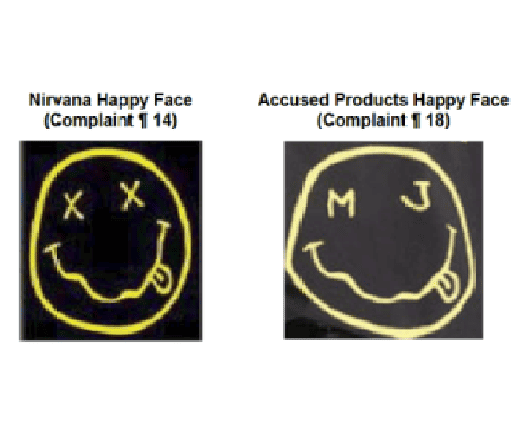A California federal court has declined to dismiss copyright and trademark infringement claims brought by the Seattle alt/grunge rock band Nirvana.
Nirvana claims ownership of the copyright for a “happy face” design originally created in 1991 by the band’s now-deceased former lead singer, Kurt Cobain.
The band also claims trademark rights for the design based on continuous use since 1992 to identify the band’s music and merchandise.
In 2018, fashion designer Marc Jacobs released a clothing collection called “Bootleg Redux Grunge” that featured a design very similar to the Nirvana happy face.
Nirvana sued for copyright infringement, false designation of origin under the federal Lanham Act (which governs trademarks), and California trademark infringement and unfair competition.
The clothing was sold by Saks Fifth Avenue and Neiman Marcus, among other retailers, which were also named as defendants.
The defendants moved to dismiss the claims, contending that:
- Nirvana failed to properly allege that it owned the copyright in the happy face design
- Nirvana can’t allege that the copyright is valid
- The Nirvana happy face and the Marc Jacobs design aren’t extrinsically similar
- There is insufficient evidence to show that the smiley face was used as a trademark by the band
- There’s no likelihood of confusion between the designs
Although the complaint was silent on the “important point” of “how or whether Mr. Cobain transferred his rights in the [Happy Face]” to Nirvana, the court found that this was not a “fatal” omission at the pleading stage and could be addressed by discovery and subsequent proceedings.
On the substantial similarity issue, the court found that both works included:
- “the slightly asymmetrical circle shape of the face,”
- “the relatively wide placement of the eyes,”
- “the distinctive ‘squiggle’ of the mouth, and
- “the placement and shape of the ‘stuck out’ tongue.”
Thus, the court found that the plaintiff’s allegations as to substantial similarity were sufficient to survive a motion to dismiss.
The case is Nirvana, LLC v. Mark Jacobs International, LLC.


